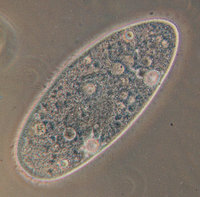Protist
|
|
| Protists | ||||
|---|---|---|---|---|
 Paramecium aurelia, a ciliate | ||||
| Scientific classification | ||||
| ||||
| Typical phyla | ||||
|
Protists are a heterogeneous group of living things, comprising those eukaryotes which are neither animals, plants, or fungi. They are usually treated as a kingdom Protista or Protoctista, first introduced by Haeckel. The protists are a paraphyletic grade, and aside from a relatively simple organization, there are not many characteristics common to the group.
Protists were traditionally divided based on similarities to the higher kingdoms. The animal-like protozoa are mostly single-celled, motile, and feed through phagocytosis, though there are numerous exceptions. They are usually only 0.01-0.5 mm in size, and are generally too small to be seen without a microscope. They are ubiquitous throughout aqueous environments and the soil, commonly surviving dry periods as cysts, and include several important parasites. Based on locomotion, protozoa are grouped into:
| Flagellates | Move using flagella | e.g. Euglena |
| Amoeboids | Move using pseudopodia | e.g. Amoeba |
| Ciliates | Move using cilia | e.g. Paramecium |
| Sporozoa | Non-motile parasites that form spores | e.g. Plasmodium |
The plant-like algae produce energy through photosynthesis. They include many single-celled creatures that are also considered protozoa, such as Euglena. Others are non-motile and colonial, and a few are truly multicellular. Of these, the green and red algae appear to be close relatives of other plants, and so may be included among the Plantae, but the brown algae developed separately.
There are also a few fungus-like protists. These are the slime moulds, which are spore-forming amoeboids, and the water moulds and labyrinthulids. The latter two are related to brown algae, golden algae, diatoms and the like, forming a group called the heterokonts. This may be placed in a separate kingdom Chromista, in which case the remaining protists may be treated as a paraphyletic kingdom Protozoa.
The classification of protists in general has undergone considerable changes. Except for the ciliates and water moulds, the traditional groups are polyphyletic and frequently overlap. Newer systems attempt to provide monophyletic groups based on ultrastructure, chemistry, and genetic features. However, an understanding of the evolutionary relationships between protists has only recently begun to emerge, and there are still many groups whose placement is uncertain. An incomplete picture is given in the table at right; other protist groups are described under the pages linked above.
